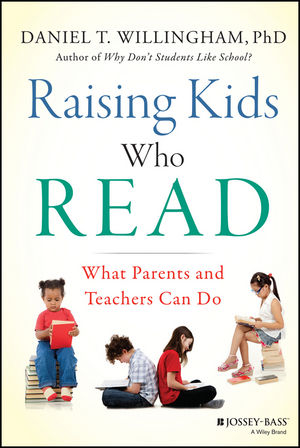
Raising Kids Who Read
Jossey-Bass Inc.,U.S. (Verlag)
978-1-118-76972-0 (ISBN)
How parents and educators can teach kids to love reading in the digital age Everyone agrees that reading is important, but kids today tend to lose interest in reading before adolescence. In Raising Kids Who Read, bestselling author and psychology professor Daniel T. Willingham explains this phenomenon and provides practical solutions for engendering a love of reading that lasts into adulthood. Like Willingham's much-lauded previous work, Why Don't Students Like School?, this new book combines evidence-based analysis with engaging, insightful recommendations for the future. Intellectually rich argumentation is woven seamlessly with entertaining current cultural references, examples, and steps for taking action to encourage reading.
The three key elements for reading enthusiasm—decoding, comprehension, and motivation—are explained in depth in Raising Kids Who Read. Teachers and parents alike will appreciate the practical orientation toward supporting these three elements from birth through adolescence. Most books on the topic focus on early childhood, but Willingham understands that kids' needs change as they grow older, and the science-based approach in Raising Kids Who Read applies to kids of all ages.
A practical perspective on teaching reading from bestselling author and K-12 education expert Daniel T. Willingham
Research-based, concrete suggestions to aid teachers and parents in promoting reading as a hobby
Age-specific tips for developing decoding ability, comprehension, and motivation in kids from birth through adolescence
Information on helping kids with dyslexia and encouraging reading in the digital age
Debunking the myths about reading education, Raising Kids Who Read will empower you to share the joy of reading with kids from preschool through high school.
DANIEL T. WILLINGHAM, PHD, is professor of psychology at the University of Virginia. His best-selling first book, Why Don't Students Like School? (Jossey-Bass, 2009), was hailed as "brilliant analysis" by the Wall Street Journal and "a triumph" by the Washington Post, recommended by scores of education-related magazines and blogs, and translated into many languages. His most recent book, When Can You Trust the Experts? How to Tell Good Science from Bad in Education (Jossey-Bass, 2012), was named recommended reading by Nature and Scientific American, and made Choice's list of outstanding academic titles for 2013.
About the Author vii
Acknowledgments ix
Introduction: Have Fun, Start Now 1
1 The Science of Reading 7
Part I: Birth Through Preschool
2 Preparing Your Child to Learn to Decode 31
3 Creating a Thirst for Knowledge 41
4 Seeing Themselves as Readers before They Can Read 57
Part II: Kindergarten Through Second Grade
5 Learning to Decode 75
6 Banking Knowledge for the Future 95
7 Preventing a Motivation Backslide 113
Part III: Third Grade and Beyond
8 Reading with Fluency 131
9 Working with More Complex Texts 145
10 The Reluctant Older Reader 165
Conclusion 189
Appendix: Accessing the Bonus Web Content 193
Suggestions for Further Reading 195
Works Cited 199
Index 219
| Erscheint lt. Verlag | 21.4.2015 |
|---|---|
| Verlagsort | New York |
| Sprache | englisch |
| Maße | 155 x 226 mm |
| Gewicht | 431 g |
| Themenwelt | Sachbuch/Ratgeber ► Gesundheit / Leben / Psychologie ► Schwangerschaft / Geburt |
| Sozialwissenschaften ► Pädagogik | |
| ISBN-10 | 1-118-76972-4 / 1118769724 |
| ISBN-13 | 978-1-118-76972-0 / 9781118769720 |
| Zustand | Neuware |
| Haben Sie eine Frage zum Produkt? |
aus dem Bereich



